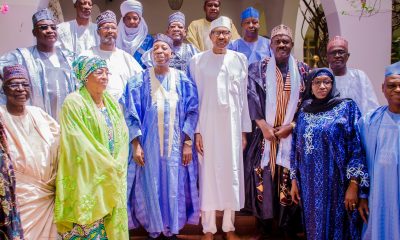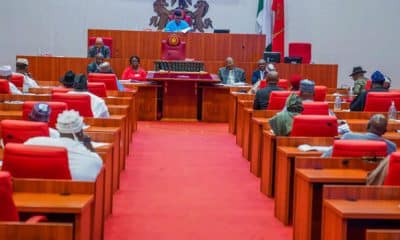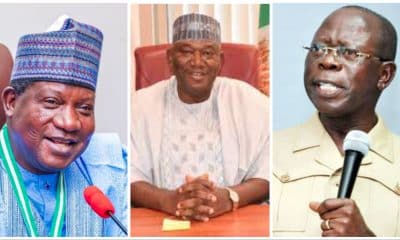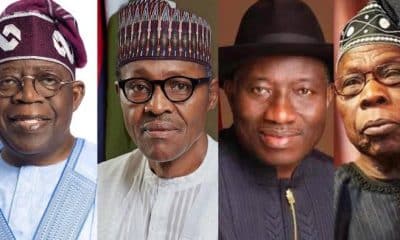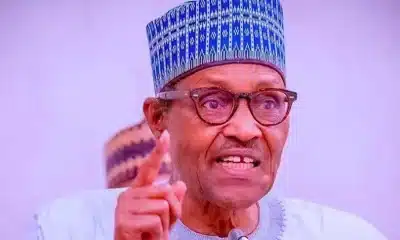Nigeria News
Buhari Knocks National Assembly, Lists Worrisome Changes In 2022 Budget

President Muhammadu Buhari has slammed the National Assembly over the alterations made to the 2022 budget.
Speaking after assenting to the budget on Friday, the Nigerian leader expressed deep concern at some of the worrisome changes made by the National Assembly to the document.
He also carpeted the federal lawmakers for reducing the funds allocated to some critical projects and adding 6,576 projects of their own to the bill.
The President said the legislature reduced N12.6 billion in the Ministry of Transport’s budget for the ongoing rail modernization projects; N25.8 billion from Power sector Reform Programme under the Ministry of Finance, Budget and National planning and N14.5 billion from several projects of the Ministry of Agriculture.
Buhari, therefore, listed the adjustment made to the budget by the lawmakers.
He said: ‘‘It is in this regard that I must express my reservations about many of the changes that the National Assembly has made to the 2022 Executive Budget proposal.
‘‘Some of the worrisome changes are as follows:
‘‘Increase in projected FGN Independent Revenue by N400 billion, the justification for which is yet to be provided to the Executive;
‘‘Reduction in the provision for Sinking Fund to Retire Maturing Bonds by N22 billion without any explanation;
‘‘Reduction of the provisions for the Non-Regular Allowances of the Nigerian Police Force and the Nigerian Navy by N15 billion and N5 billion respectively.
‘‘This is particularly worrisome because personnel cost provisions are based on agencies’ nominal roll and approved salaries/allowances;
‘‘Furthermore, an increase of N21.72 billion in the Overhead budgets of some MDAs, while the sum of N1.96 billion was cut from the provision for some MDAs without apparent justification;
‘‘Increase in the provision for Capital spending (excluding Capital share in Statutory Transfer) by a net amount of N575.63 billion, from N4.89 trillion to N5.47 trillion.”
The President also faulted the lawmakers for introducing over 1,500 new projects into the budgets of some ministry and their agencies.
He expresses surprise that despite the legislature increasing projected revenue by N609.27 billion, the lawmakers couldn’t add the executive request of N186.53 billion for critical expenditure items without increasing the deficit.
Buhari wondered why the sum of N550.59 billion from the projected incremental revenues was allocated at the discretion of the National Assembly.
The president, however, said that he would send the budget back to the national assembly for amendment as soon as the lawmakers resume to ensure that critical ongoing projects cardinal to his administration get adequate funding.
He said: ‘‘Inclusion of new provisions totalling N36.59 billion for National Assembly’s projects in the Service Wide Vote which negates the principles of separation of powers and financial autonomy of the legislative arm of government.
‘‘The changes to the original Executive proposal are in the form of new insertions, outright removals, reductions and/or increases in the amounts allocated to projects.
‘‘Provisions made for as many as 10,733 projects were reduced while 6,576 new projects were introduced into the budget by the National Assembly.
‘‘Reduction in the provisions for many strategic capital projects to introduce ‘Empowerment’ projects.
‘‘The cuts in the provisions for several of these projects by the National Assembly may render the projects unimplementable or set back their completion, especially some of this Administration’s strategic capital projects.
‘‘Most of the projects inserted relate to matters that are basically the responsibilities of State and Local Governments and do not appear to have been properly conceptualised, designed and cost.
‘‘Many more projects have been added to the budgets of some MDAs with no consideration for the institutional capacity to execute the additional projects and/or for the incremental recurrent expenditure that may be required.’’

